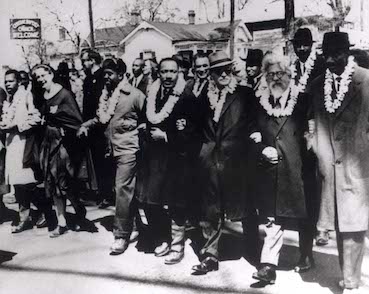In an eye-opening lecture at Hillel this week, Paul Von Blum spoke to students about his life of social activism and unshaken secular Jewish identity. A second-generation Holocaust survivor, he claims his experience in civil rights began before his birth in Berlin, where his family was taken by the Gestapo and moved directly to their deaths in Auschwitz. He knows that the racism directed towards the Jewish people around the world is founded by the same exact sentiments behind the racism directed against African-Americans in the United States today.
Growing up in mid-1950’s Unites States, Blum credits his family’s active quest for social equality — particularly against racial discrimination—as the driving force of his lifelong activism, and his unapologetic Jewish vision for social justice. It was the direct connection to his own family’s suffering in Auschwitz that made it clear that the systematic racism in Nazi Germany is identical to what has continually oppressed our African-American brothers and sisters in the United States historically, and today.
Blum estimates that in the 1960s, nearly 70% of white protesters — who were most active in the South, and later on the East and West Coasts — were Jewish. One such notable figure is Rabbi Abraham Joshua Heschel, who was a prominent member in the civil rights movement. He is depicted in the famous photograph of the civil rights march in Alabama (pictured with John Lewis and Ralph Bunche among others).
This begs the question: what role is Jewish youth playing in the movement today? Has the comfort of our “white” privilege allowed us to forget the anti-Semitism our people experienced until this very day? Does the exceptionally high population of our Jewish community on campus make it easy to lose sight of the fact that we are innately a minority?
Blum unapologetically condemns the fact that so many contemporary Jewish students are moving away from social activism (and even worse, towards American materialism).
The majority of Jewish people possess a privilege in skin color, making it so that we are not subject to random and intrusive police searches. This does not mean that we are free of targeted discrimination, nor does it permit us to turn a blind eye to the mistreatment of others. We must use our privilege in a conscious effort to uplift those who are not afforded the same liberties.
Rabbi Chaim Seidler-Feller’s religious insights hammered home those points and ended the discussion on a well-needed, uplifting point. “Social change,” he said, “is embedded in the Jewish religion, and the Torah is the instrumental guidance book to our duty as servants of equality for all.”
Rabbi Chaim dismisses the misconception that the Bible identifies the Jewish people to be superior to other peoples, stressing the fundamental truth that we are all equal. The Mishnah (Sanhedrin 4:5) tells us, “Man was created alone to teach you that whoever destroys a single soul is deemed by Scripture as if he had destroyed a whole world… Whoever saves a single soul is deemed by the Scripture as if he had saved a whole world… it was also for the sake of peace among people, so that someone should not say to his fellow, ‘My father is greater than your father.’”
Rabbi Chaim offers our experience with suffering as a justification as to why some of us have been reluctant to help. As victims, we have two options: lead the life of a victim and feel as though the world owes us recompense, or use our victimhood as a platform to identifying with the suffering of others, and help them in ways they cannot help themselves.
So which one will you choose? Will you take comfort in your privilege and sit silently as our brothers and sisters struggle? Or will you use your privilege to perpetuate positive social change and make this world a better place?
Racism anywhere is racism everywhere. Our struggle is not over yet.

